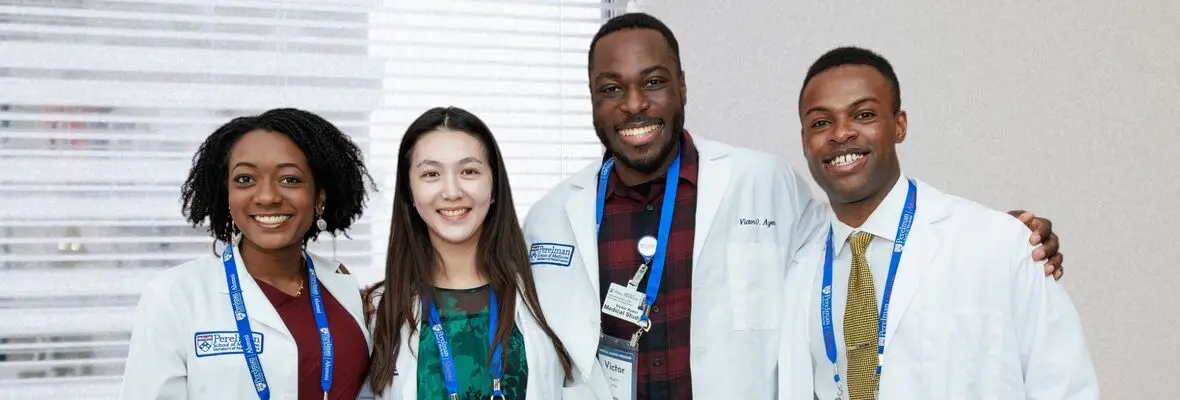Student-Led Clinical Opportunities
According to the Association of American Medical Colleges (AAMC), compassion and service are essential to being a doctor. The Perelman School of Medicine students' commitment to community service demonstrates this belief. Through such service, students provide important support to communities that are too often left out of the healthcare system, while learning valuable skills.
For more information, please contact IDEAL MEd.
The mission of The Center for Surgical Health is to create sustainable infrastructure through which all members of our community can access high-quality, cost-conscious surgical care, despite socioeconomic, political, racial, cultural, or gender-based disparities. We have subspecialty clinics in general surgery, urology, orthopaedic surgery, plastics and hand surgery, neurosurgery, ENT, and women’s health. Volunteers serve as personal patient navigators (PPNs) that support, educate, and advocate for vulnerable Philadelphians with operable disease. At clinic, PPNs assist surgical residents with patient intake and evaluate patients for surgical need. PPNs are then assigned individual patients to follow through the perioperative continuum. In this role, PPNs help acquire insurance coverage, schedule appointments, communicate with the surgical team, and more. PPNs then accompany their patients to appointments and, ultimately, to surgery.
Children's Hospital of Philadelphia (CHOP) Family Connects works to provide emotional support and identify social needs among families presenting to the CHOP ED and provides information about applicable community-based resources. During the COVID-19 pandemic, Family Connects reached out to families at ED visits, both in person and via phone, and offered assistance in connecting them to needed services.
Children's Hospital of Philadelphia Homeless Health Initiative provides free health services to women and children living in local emergency housing shelters. As part of a clinical team, medical student volunteers assist with history and physical exams and in medical counseling of patients. Volunteers also interact with patients and their families to gain exposure to and knowledge of the impact of homelessness on children’s lives and health.
Covenant House provides a full range of services to meet the complex needs of homeless and runaway youth. Medical students conduct history and physical examinations, and they engage with the youth in nonclinical activities, such as board games and karaoke.
The Student National Medical Association (SNMA) Cut Hypertension program provides blood pressure screenings and information about the risks of hypertension, especially among Black males, every Saturday in a barber shop in the heart of West Philadelphia.
A branch of the United Community Clinic, Heart Health Bridge to Care (HHBC) clinic provides long-term care to underinsured individuals in the Parkside section of Philadelphia. Medical students work with nursing, pharmacy, and social work students as well as faculty to develop care plans for patients with heart disease.
Medical student volunteers work with Philly Restart to connect individuals experiencing homelessness with healthcare and social services.
Philadelphia Human Rights Clinic (PHRC) is a student-run organization with a mission to provide no-cost psychiatric and physical evaluations of survivors of persecution seeking asylum in the United States.
Puentes de Salud works to ensure the wellness of the Latino immigrant population in South Philadelphia by offering medical care, education, and social services. Medical student volunteers contribute to clinical teams for patient care and participate in the Diabetes Management Program, a longitudinal experience. There are also leadership opportunities for other nonclinical projects run by the organization.
Philadelphia Refugee Health Collaborative provides health education and culturally competent healthcare to refugees who have resettled in Philadelphia. Medical students plan and provide patient education sessions on various health topics and also contribute to clinical care.
Social Needs Response Team (SNRT) is a clinical social-worker-supervised virtual interdisciplinary team of graduate-level health professionals (medicine, nursing, social work) who seek to address patient safety, distress, and a myriad of other unmet social needs in order to effectively mitigate their compounding negative effects on health. Students work in teams of two or three to intake and triage referrals to a Pennchart pool and phone line; screen referrals for social needs, safety, and distress; appropriately refer for resources; and support people who are referred in connecting to those resources.
United Community Clinic is a free health clinic coordinated by University of Pennsylvania students that provides care to mostly African-American men and women between the ages of 16 and 65, who are often uninsured or underinsured. Medical students help by taking patient histories, performing physical exams, and presenting to resident and attending physicians.
Unity Clinic is a free clinic that primarily serves uninsured Indonesian immigrants of Chinese descent. Medical student volunteers assist and shadow Penn faculty and residents. On clinic evenings, medical students are involved in medical scribing, taking patient histories, checking blood pressure, calculating BMI, retrieving medications, and more. Volunteers also give presentations to small groups of patients on basic topics in health and medicine.
University City Hospitality Coalition provides services to homeless people in West Philadelphia, including hot meals, a medical clinic, a dental clinic, a legal clinic, and referral services for shelter, housing, food, and clothing. The medical clinic is staffed by Penn students, physicians, and pharmacists. Medical clinic services include acute and emergent care; diabetes and hypertension screenings; podiatry consultations; dermatology consultations; flu shots; condom distribution; and referrals to social services.


